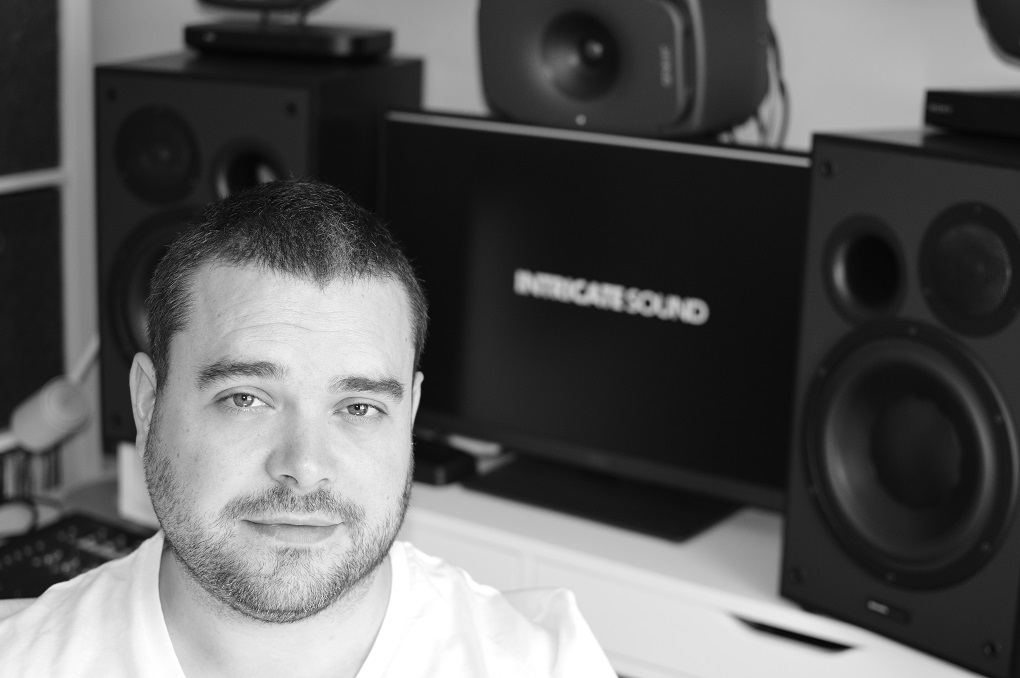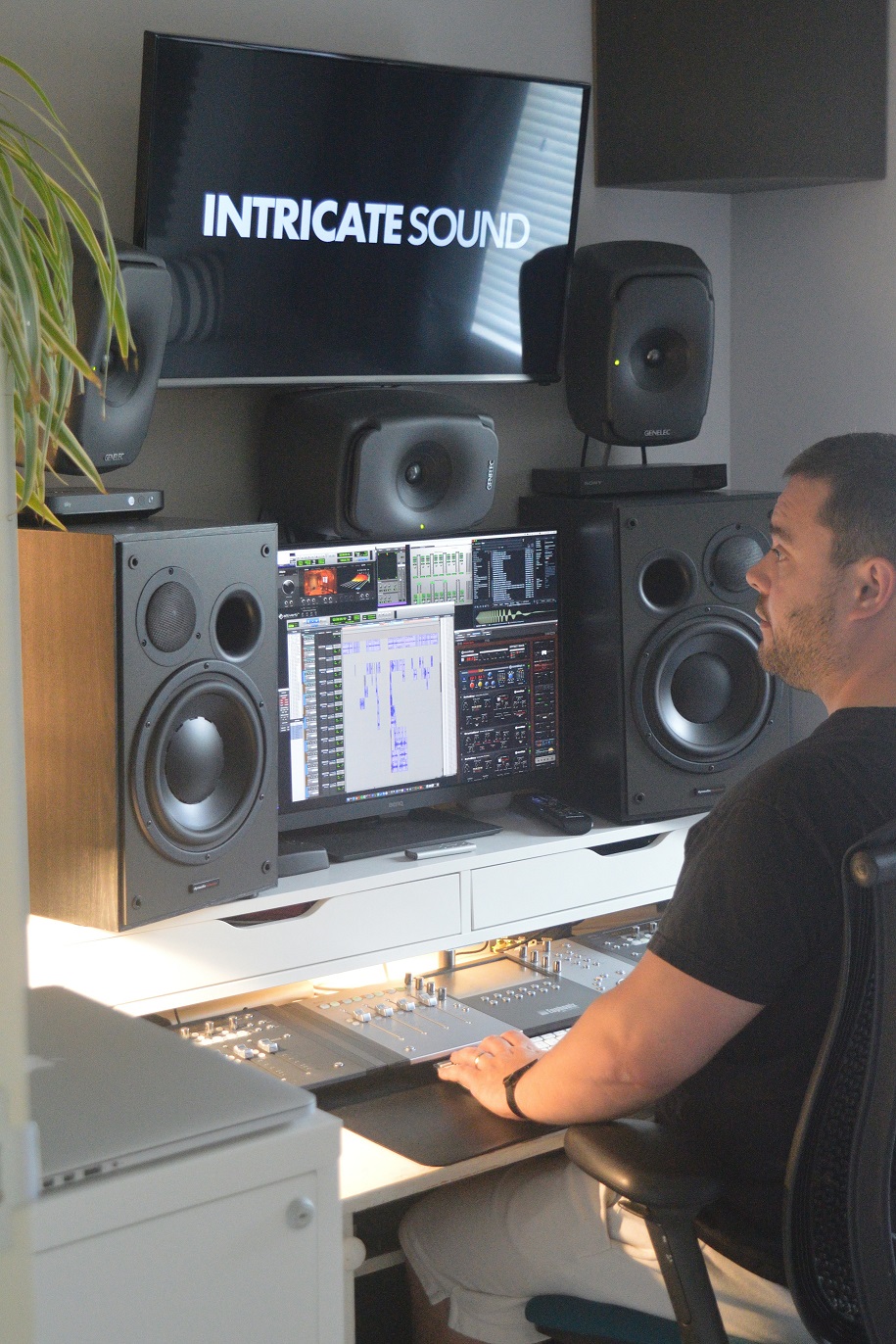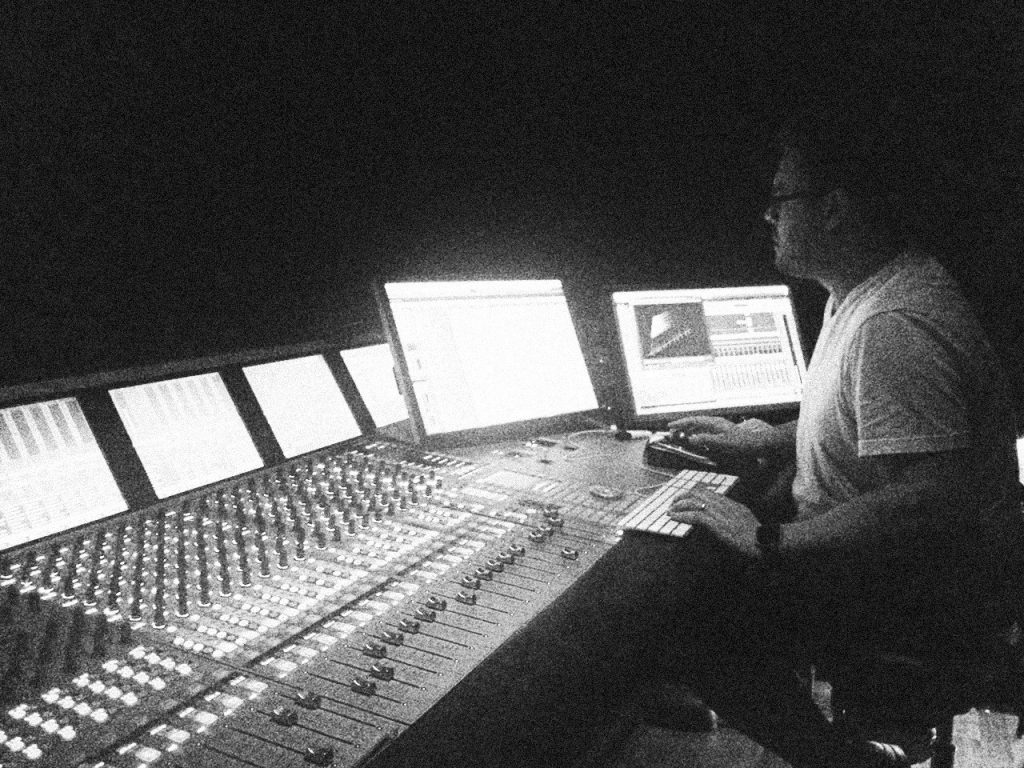Sound, putting you in the picture. Ben Carr, of Intricate Sound – Interview
By Claire Bueno 4 years ago
By Claire Bueno
My first encounter with Ben Carr of Intricate Sound was when I engaged his services for a documentary I produced called CLEANIN’ UP THE TOWN: Remembering Ghostbusters, and I am so glad I did!
For any filmmaker considering submitting their film to a film festival or wishing to receive any kind of professional recognition, factoring sound design in to your post-production schedule is essential.
The curse of digital is that software makes it look easy. Anyone can dabble and level-up the sound, right? WRONG! Sound design is a specialist skill, it’s a craft. Employing the services of the wrong person will cost you time and money, believe me I speak from personal experience.
Ben Carr is the real deal, he truly cares and he invests himself 100%, however rocky the road. So when Ben accepted my interview request I was thrilled to have the opportunity to share more of what constitutes sound design and enlighten us all with a few tips to improve our own filmmaking practices.

Ben, Can you explain the role of a Sound Designer and Re-Recording Mixer is?
When you’re making a film or documentary, sound post-production is one of the last steps in the filmmaking process. I think the best way to describe a sound designer's role is as the person responsible (along with the director of course) for the creative sound choices within a film's soundtrack. The sound designer works closely with the director to decide what sounds an audience will hear at any given point in the film’s soundtrack and execute creative choices that work best in the context of the film.
The sound designer is also typically the supervising sound editor on a film or TV show and they will usually be the film director’s Head of Department for sound-post on this final stage of finishing the film. They coordinate with the sound crew and manage the schedule, and, alongside their own work of realising the director's vision, will compile the sound editor’s tracks and then deliver all the material to the mixer for the last leg of the journey, the mix.
A re-recording mixer has a more straightforward role, working with the sound designer and director, on the final part of the process to bring together all the elements that make up the whole soundtrack and balance them in the most effective way to tell the story. Utilising a whole raft of sound processing equipment and software, they will take the dialogue and production sound, ADR, foley, sound effects and sound design supplied by the sound designer and the score from the composer and weave them together to create the final mix. During this process they will be making sure all technical specifications are met and everyone in the room has their say, creative choices are explored and final decisions made.
There is also a distinction to be made between a sound designer and what they do and the term Sound Design. Sound Design can broadly describe both the sounds used and choices of how we hear the sound and music within the soundtrack. A classic example is in ‘Saving Private Ryan’ where an explosion happens and as an audience we experience the effects of muffled sound and ringing ears. Another is in ‘Baby Driver’ where we hear the music from Baby’s point of view and it moves from being diegetic (played to sound within the scene through headphones) to score to emphasise the action. It can also apply to sounds that don’t exist in reality. In ‘Ghostbusters’ the sound of the proton pack and the proton beams had to be imagined and realised while serving the story, one of many vital details in that film which add up to the end result. The Sound Design in these cases would have been reached through the combined efforts of the whole sound department and the director, Sound Design is always a creative collaboration.
There is also a crossover where sound design can be almost musical or work in similar ways to the score to convey emotion, tension and embellish the visuals. Acting like a bridge between sound effects and music. It’s quite a complex term that simplifies many ideas and approaches to storytelling through sound.
What for you is the beauty of sound and how does it enhance a film?
For me, the beauty of sound is that it works on both a conscious and a subconscious level. Hearing is arguably the most important of our senses. Although you may not necessarily be aware of it, in humans it is always working to some degree, when we blink or cover our eyes, even while sleeping. It’s a sense that is constantly processing a huge amount of information about the world around us, perhaps more than we may appreciate. Through careful use of sound and music you can not only tell your story in many ways but also convey emotion and connect with what it is to be human. When you successfully combine visual storytelling with sound that connects the characters to our emotions the results can totally elevate the whole experience.

Through our working together, you’ve always informed me that sound has to follow the picture, can you elaborate?
When you’re working to a tight deadline you can lose a lot of valuable time in your schedule to conforming the sound to match picture changes. It’s important that all the source video is at the correct frame-rate before you start. Making sure these potential issues are found and corrected as early on in the process will help make the post-production on the film as smooth as possible. We cannot preempt these issues and so the source video has to be correct first for the sound to follow it and be correct.
On first appearances, your role appears to form part of the post-production process, is this the case? How early in the process should your services be engaged?
Sometimes you’re introduced to a project very late in the process as the sound-post is about to begin, or even after it has begun and has perhaps gone slightly wrong! In my experience, the earlier the sound designer can be involved the better the end results can be. Being available to work with the director in pre-production to discuss the sound aspects of the script can really pay off in the long run. Also sharing work and communicating with the composer can really pay off and enhance the overall production. If I’m onboard in the process at this point, I always try to work alongside the picture editor during the offline editing process to supply sound effects to help the edit and give advice where needed and appropriate.
There’s a lot that can be achieved in post-production, but have you any tips you can give to ensure that sound is recorded at its optimum quality?
It’s true that today we are lucky that a lot of recordings can be saved thanks to huge advances in software and computer processing power. In terms of recording interviews, my number one tip is if possible, hire a professional sound recordist to look after this aspect for you while filming. And if this is not practical or possible, my best advice is to try to record in a controlled environment. By this I mean choose somewhere that is as quiet and as comfortable as possible, ideally somewhere that has very low to zero background noise. You want your interviewee to be relaxed and focus on what they are talking about without distractions. Listen to the environment through your kit and make sure that anything that is buzzing or humming is switched off. Aim to minimise reflections (echoes from nearby hard
surfaces) using sound blankets to dampen the room and good placement of suitable microphones is very important. Always check the recordings while shooting is in progress and make adjustments where necessary. Reducing, minimising and fixing any issues as best you can while filming can make an enormous impact on the end result.
“For me, the beauty of sound is that it works on both a conscious and a subconscious level. Hearing is arguably the most important of our senses.”
There’s obviously technical expertise required of your role, but does your role allow you to express yourself creatively?
Yes it does, I’ve always been drawn to and fascinated by the fusion of both the technical and creative aspects that come with working with sound. I really love working with filmmakers and being able to express myself creatively through my work is not only massively important but also comes with a great reward. My input to any film or project should not even be noticed but should still elevate the audience's experience and enjoyment of what they are watching. This is always one of your main objectives of work as a sound designer.
How does sound differ between feature film, documentary or corporate film making?
I’ve found that the main things, in no particular order, are: the schedule; the end delivery format; and the number of people involved in the creative process. With independent films you have a much greater rapport and build a close working relationship with the director. Unless you have gained entry to a film festival or have an immediate deadline, you may have a bit more time to consider your choices. No matter the situation I aim to use every available second in the schedule to maximise the end result. When working to a tight deadline you have to focus on and prioritise areas of your work and make decisions very quickly. Often with a corporate or commercial job you are working with more people with a creative input and when aiming for a deadline you have to make sure all people involved are happy as well as the work being finished on time and on budget.
How much time should a filmmaker allow for post-production sound?
It all depends. A documentary might be more straightforward in terms of sound than a fiction drama; an animation may be more complex than a horror film and so on. A lot of work can be done faster now than ever before and with smaller crews. As with all aspects of film-making your budget will dictate how much time each department has to spend. The sound-post on a feature documentary can be completed in 3-4 weeks, an action film may take months. Careful planning and budgeting will allow you to maximise the time that can be spent on sound.

Film is very much a collaborative process, I imagine your job is to listen to what the director wants, but is it also your responsibility to make your suggestions?
Exactly right, a good analogy for sound is to imagine we’re going on a road trip and the work is the journey itself, the destination is your finished film. All along the way you are having a continuous conversation between the passengers. In the vehicle you have your director who knows more or less where we want to end up and the sound designer who has planned the journey and as a re-recording mixer you’re at the wheel driving and following the director’s navigation and sound designers map. You could suggest a shortcut based on your experience or highlight that the suggested route forward is going to take a lot of time and use the time you are saving on other details within the work. Sometimes you’ll want to take the scenic route, other times you’ll be in the open road with no traffic and you may want to stop and stretch your legs on an idea. Other times it’ll be intense, you may hit a bump in the road and you put on the AC and grab some refreshments and regroup, other times you simply need to rest before you carry on.
You always have to be prepared to go the long way if that is what is needed. Sometimes there’s no straightforward way to get where we need to be. Everyone has to think on their feet and sometimes you can take the lead and put forward your suggestions and they are accepted. Other times you try several ideas and vote which way is most effective. Sometimes you follow the direction given and you don't even notice the journey or how far you've travelled. Communication and trust are central to this process, you want to make sure you’re going the right way at all times and you may have to put your ego aside and accept that a suggestion isn't working or was a wrong turn and you get back on course quickly. This is all part of the process and the most interesting ideas sometimes come from a crazy suggestion or a whimsical proposition that can end up taking centre stage. This is all part of the fun.
How important is knowing how and where the film is going to be screened / broadcast or transmitted to your end results?
Very important as there are different technical specs that need to be met for different playback environments. Sound for the cinema, trailers, tv and broadcast and web all have their own spec. Meeting these requirements and making sure the work sounds as good as possible is a challenge I enjoy.
What’s the most satisfying part of your job?
Without a doubt it is seeing a film finished for the first time. I always insist on signing off the sound mix with the final graded video to be sure that everything is in sync and working as we intend. Sometimes VFX can come in at the last possible moment and what you’ve imagined hearing and what you are seeing are slightly different and you need to work quickly to get everything right. Overcoming these challenges and playing back the final mix in the studio with the finished pictures for the first time means we are among a small number of people to witness a film being born so to speak. This is an enormous privilege and a hugely rewarding pay off for the amount of time and effort that goes into making a film sound its best. Thanks so much for the questions!
Contact Ben Carr

Claire Bueno
Claire Bueno is a film journalist, presenter and interviewer, having moderated BAFTA, Royal Television Society (RTS), Women in Film and Television (WFTV), and Apple Store Q&As and hosted Comic Con panel talks. Claire is the founder of Premiere Scene Magazine and has had the privilege of interviewing esteemed artists including Tom Cruise, George Clooney, Brad Pitt, Sir Anthony Hopkins, Sigourney Weaver, Emily Blunt, Samuel L Jackson, James Cameron and Andy Serkis.
As a media coach Claire works with leading personal publicists, HBO, Netflix, Sky, ITV, Penguin Random House, the BFI, DDA, MacMillan and Premier, offering practical coaching sessions and safe environment for talent to perfect their interview technique before facing the press. She has extensive experience working with emerging and seasoned professionals and where English is not their first language.
Additionally, Claire is the producer of the critically acclaimed feature documentary CLEANIN’ UP THE TOWN: Remembering Ghostbusters and the upcoming TOO HOT TO HANDLE: Remembering Ghostbusters II.